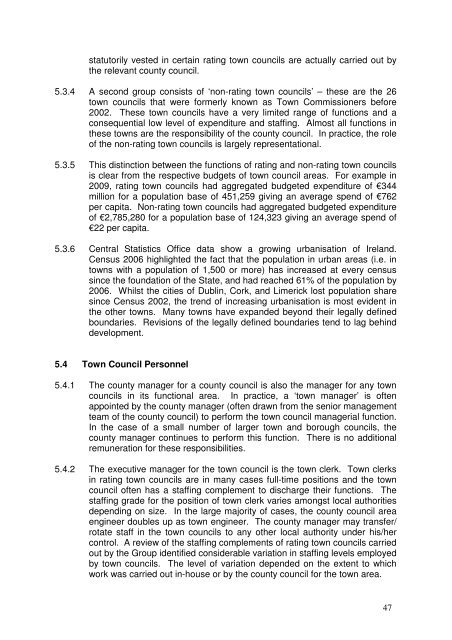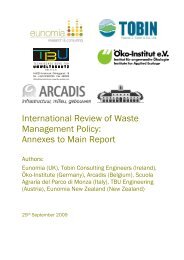Report of the Local Government Efficiency Review Group
Report of the Local Government Efficiency Review Group
Report of the Local Government Efficiency Review Group
Create successful ePaper yourself
Turn your PDF publications into a flip-book with our unique Google optimized e-Paper software.
statutorily vested in certain rating town councils are actually carried out by<br />
<strong>the</strong> relevant county council.<br />
5.3.4 A second group consists <strong>of</strong> ‘non-rating town councils’ – <strong>the</strong>se are <strong>the</strong> 26<br />
town councils that were formerly known as Town Commissioners before<br />
2002. These town councils have a very limited range <strong>of</strong> functions and a<br />
consequential low level <strong>of</strong> expenditure and staffing. Almost all functions in<br />
<strong>the</strong>se towns are <strong>the</strong> responsibility <strong>of</strong> <strong>the</strong> county council. In practice, <strong>the</strong> role<br />
<strong>of</strong> <strong>the</strong> non-rating town councils is largely representational.<br />
5.3.5 This distinction between <strong>the</strong> functions <strong>of</strong> rating and non-rating town councils<br />
is clear from <strong>the</strong> respective budgets <strong>of</strong> town council areas. For example in<br />
2009, rating town councils had aggregated budgeted expenditure <strong>of</strong> €344<br />
million for a population base <strong>of</strong> 451,259 giving an average spend <strong>of</strong> €762<br />
per capita. Non-rating town councils had aggregated budgeted expenditure<br />
<strong>of</strong> €2,785,280 for a population base <strong>of</strong> 124,323 giving an average spend <strong>of</strong><br />
€22 per capita.<br />
5.3.6 Central Statistics Office data show a growing urbanisation <strong>of</strong> Ireland.<br />
Census 2006 highlighted <strong>the</strong> fact that <strong>the</strong> population in urban areas (i.e. in<br />
towns with a population <strong>of</strong> 1,500 or more) has increased at every census<br />
since <strong>the</strong> foundation <strong>of</strong> <strong>the</strong> State, and had reached 61% <strong>of</strong> <strong>the</strong> population by<br />
2006. Whilst <strong>the</strong> cities <strong>of</strong> Dublin, Cork, and Limerick lost population share<br />
since Census 2002, <strong>the</strong> trend <strong>of</strong> increasing urbanisation is most evident in<br />
<strong>the</strong> o<strong>the</strong>r towns. Many towns have expanded beyond <strong>the</strong>ir legally defined<br />
boundaries. Revisions <strong>of</strong> <strong>the</strong> legally defined boundaries tend to lag behind<br />
development.<br />
5.4 Town Council Personnel<br />
5.4.1 The county manager for a county council is also <strong>the</strong> manager for any town<br />
councils in its functional area. In practice, a ‘town manager’ is <strong>of</strong>ten<br />
appointed by <strong>the</strong> county manager (<strong>of</strong>ten drawn from <strong>the</strong> senior management<br />
team <strong>of</strong> <strong>the</strong> county council) to perform <strong>the</strong> town council managerial function.<br />
In <strong>the</strong> case <strong>of</strong> a small number <strong>of</strong> larger town and borough councils, <strong>the</strong><br />
county manager continues to perform this function. There is no additional<br />
remuneration for <strong>the</strong>se responsibilities.<br />
5.4.2 The executive manager for <strong>the</strong> town council is <strong>the</strong> town clerk. Town clerks<br />
in rating town councils are in many cases full-time positions and <strong>the</strong> town<br />
council <strong>of</strong>ten has a staffing complement to discharge <strong>the</strong>ir functions. The<br />
staffing grade for <strong>the</strong> position <strong>of</strong> town clerk varies amongst local authorities<br />
depending on size. In <strong>the</strong> large majority <strong>of</strong> cases, <strong>the</strong> county council area<br />
engineer doubles up as town engineer. The county manager may transfer/<br />
rotate staff in <strong>the</strong> town councils to any o<strong>the</strong>r local authority under his/her<br />
control. A review <strong>of</strong> <strong>the</strong> staffing complements <strong>of</strong> rating town councils carried<br />
out by <strong>the</strong> <strong>Group</strong> identified considerable variation in staffing levels employed<br />
by town councils. The level <strong>of</strong> variation depended on <strong>the</strong> extent to which<br />
work was carried out in-house or by <strong>the</strong> county council for <strong>the</strong> town area.<br />
47
















